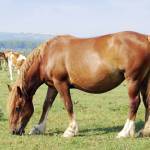Arginine Supplementation of Broodmares: Research Review

The amino acid arginine has many roles in the body, including nitrogen metabolism and excretion, vasodilation, and immune response. Researchers have more recently explored the value in supplementing arginine to broodmares, potentially boosting fertility and reproductive success.
Uterine fluid accumulation in mares is thought to limit fertility and is often cited as a factor in early embryonic loss. Scientists at the University of Florida hypothesized that mares supplemented daily with 100 g of arginine from 20 days before the expected foaling date would have increased uterine blood flow, which would hasten clearance of uterine fluid following parturition and possibly improve fertility. The researchers found that mares supplemented with arginine had a significant reduction in the amount of intrauterine fluid present and increased blood flow to the previously pregnant horn. Arginine may therefore enhance fertility of foaling mares with chronic intrauterine fluid accumulation.1
However, a later study at the same research center found that short-term supplementation with 100 g arginine didn’t increase uterine blood flow or fluid clearance in open mares during estrus.2
Arginine supplementation has been shown to suppress cell-mediated immunity in several species, and researchers investigated this in foaling mares that received 100 g arginine or a placebo for 21 days before expected foaling date and a month after foaling. Supplementation did not affect B-lymphocytes but may suppress T-lymphocyte mitogenesis in lactating mares. Further research is need to determine if arginine supplementation influences the risk of infection in broodmares.3
The importance of arginine for conceptus growth has been demonstrated in various species. Arginine stimulates uterine blood flow and protein synthesis by the embryo. In one study, researchers investigated the effect of ~60 g oral arginine supplementation from day 15 until day 45 after ovulation. The size of the embryo/fetus was significantly larger in arginine-treated mares than in untreated control mares from day 25 to 45 after ovulation. In conclusion, arginine supplementation supports embryonic growth before and at the beginning of implantation.4
French researchers looked at the effect of 100 g of arginine per day on pregnant maiden and multiparous mares in the last third of pregnancy. At birth, arginine-supplemented foals were heavier than control foals, but plasma amino-acid concentrations and placental weight did not differ between groups. Control maiden mares seemed to be less able to adapt metabolically to pregnancy compared to multiparous mares. Arginine supplementation affected amino-acid absorption in pregnant mares but not in foals at birth, improved the glucose metabolism of maiden dams, and increased the weight of foals at birth. Arginine may be a useful supplement to improve maternal metabolism and increase foal birth weight in maiden mares.5
Arginine supplementation may benefit mares that are prone to delayed uterine clearance after foaling or after breeding, either live cover or artificial insemination. Arginine may increase the size of the foal in both maiden and aged mares, although this area requires further research.
“While feeds designed for mares will contain some arginine, there’s not enough to supply these levels of supplementation,” said Peter Huntington, B.V.Sc., M.A.C.V.Sc., director of nutrition at Kentucky Equine Research. “Breeders would need to purchase the raw amino acid as a powder and add it to the feed.”
Working with a nutritionist well versed in the needs of broodmares is one way to ensure reproductive success. Do you have a question for an equine nutritionist? Start here.
1Kelley, D.E., L.K. Warren, and C.J. Mortensen. 2011. L-arginine supplementation reduces uterine fluid accumulation post foaling in the mare. Journal of Equine Veterinary Science 31:315-316.
2Jacobs, R.D., L.K. Warren, and C.J. Mortensen. 2013. Effect of oral L-arginine supplementation on uterine blood flow and fluid clearance in mares during estrus. Journal of Equine Veterinary Science 33:373-374.
3Bobel, J., and L.K. Warren. 2013. Lymphoproliferative response in broodmares supplemented with arginine. Journal of Equine Veterinary Science 33:331-332.
4Köhne, M., M. Wulf, E. Beythien, C. Gauthier, K. Männer, J. Zentek, and C. Aurich. 2018. Effects of L-arginine supplementation to early pregnant mares on conceptus development and growth. Journal of Equine Veterinary Science 66:201.
5Chavatte-Palmer, P., E. Derisoud, M. Robles, C. Dubois, C. Richard, M. Dahirel, J. Calvez, A. Couturier-Tarrade, and L. Wimel. 2018. Effects of dietary arginine supplementation in pregnant mares on maternal metabolism and foal birthweight. Journal of Equine Veterinary Science 66:225.








